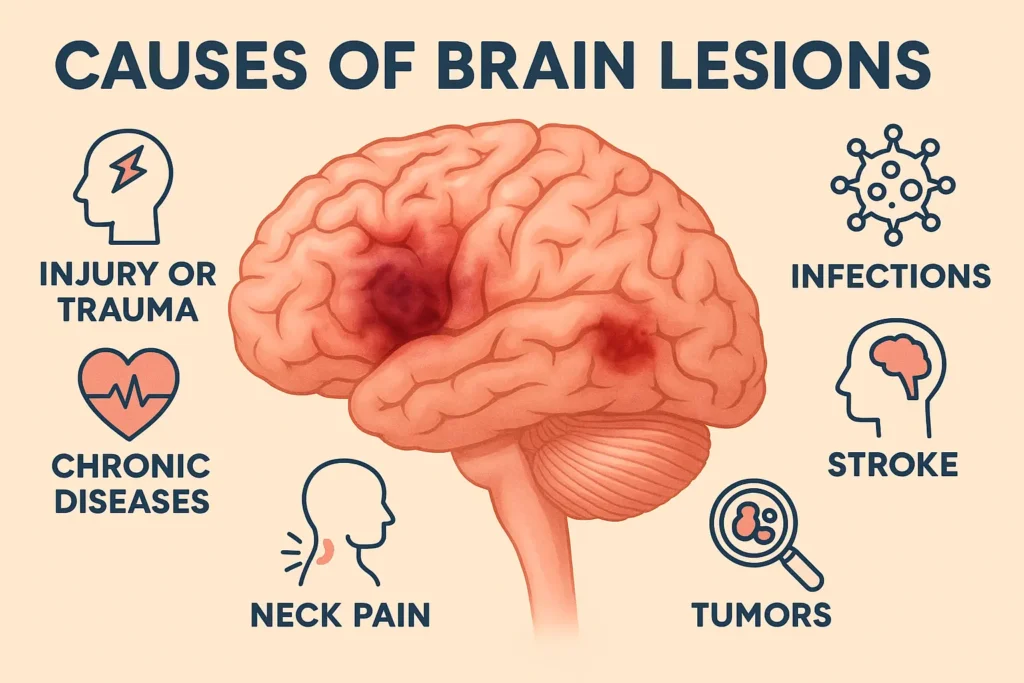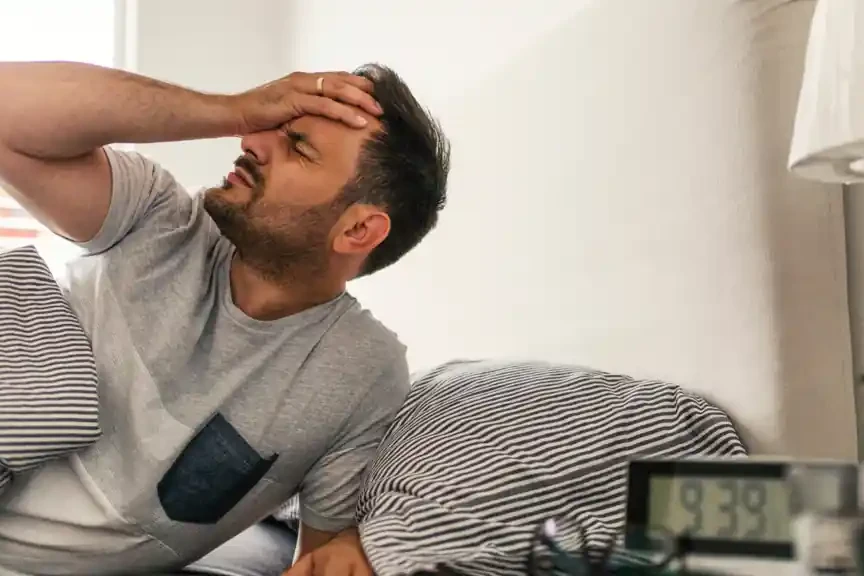Brain lesions are areas of damage in the brain tissue, and understanding them is crucial for your health. While the term “brain lesion” might sound serious, not all lesions are harmful. Brain lesions can vary from benign spots to potentially life-threatening conditions.
In this blog, we’ll explore what brain lesions are, their causes, symptoms, types, and how they are treated. You’ll also get insight into prevention and when to seek medical advice.
Table of Contents
ToggleWhat Are Brain Lesions?
Brain lesions are abnormal areas in the brain caused by injury, disease, or other factors. These lesions may influence brain function based on their size, type, and location. The term “lesion” refers to any damage in tissue, and in the brain, it could mean anything from a mild bruise to a serious condition like a stroke or brain tumor.
When doctors talk about brain lesions, they are referring to any damage or injury in the brain’s tissuse that affects its normal functioning. Brain lesions symptoms can vary greatly depending on where the damage occurs, so recognizing early signs is important.
In some cases, early symptoms of brain lesions may be subtle and go unnoticed, but in other situations, they can lead to more severe problems like seizures, vision changes, or memory loss.
What Causes Brain Lesions?

Many things can cause brain lesions, including:
- Injury or Trauma: A blow to the head can cause a brain lesion, which might lead to brain bleeding or swelling.
- Infections: Some infections, like bacterial or viral infections, can lead to lesions. For instance, brain lesions caused by toxoplasmosis result from a parasitic infection.
- Chronic Diseases: Conditions like multiple sclerosis (MS) or lupus can cause lesions. These diseases affect the immune system, leading to inflammation and damage to brain tissue.
- Strokes: A stroke occurs when the blood flow to part of the brain is blocked, leading to cell death, which forms a lesion.
- Tumors: Certain brain tumors, whether benign or malignant, can lead to the formation of lesions in the brain.
In numerous instances, the precise cause of a brain lesion may remain unclear.
What Are the Symptoms of a Brain Lesion?
The symptoms of brain lesions vary depending on the size, location, and type of lesion. Common symptoms include:
- Headaches: Persistent or severe headaches.
- Vision Changes: Difficulties in seeing clearly, experiencing blurred vision, or encountering double vision.
- Seizures: Unexplained seizures could be a sign of a lesion.
- Memory Problems: Difficulty remembering things, confusion, or trouble with concentration.
- Mood Changes: Personality changes, irritability, or sudden mood swings.
- Motor Issues: Difficulty moving certain parts of the body or weakness.
- Neck Pain: Pain and stiffness in the neck, which might also indicate inflammation.
Should you experience any of these symptoms, it is crucial to consult a healthcare professional for assessment.
What Are the Different Types of Brain Lesions?
There are several types of brain lesions:
- Abscesses: Areas of infection in the brain, often caused by bacteria.
- Arteriovenous Malformations (AVMs): A cluster of blood vessels in the brain that may rupture and lead to bleeding.
- Cerebral Infarction: Brain tissue death caused by a lack of blood supply, commonly known as a stroke.
- Multiple Sclerosis Lesions: Caused by an autoimmune attack that damages the protective covering of nerve cells.
- Brain Tumors: Either cancerous or benign, they can cause lesions by growing abnormally.
Each type of lesion may require different treatments and approaches, which we will cover in the next section.
How Are Brain Lesions Diagnosed?
To diagnose brain lesions, doctors use imaging tests such as:
- MRI: Magnetic Resonance Imaging scans are the most common tool to find lesions. They provide clear images of brain tissue.
- CT Scan: A Computed Tomography scan can also be used, though it’s less detailed than an MRI.
- Blood Tests: In some cases, doctors may run blood tests to look for infections or autoimmune markers that could be linked to brain lesions.
Early detection is crucial for effective treatment.
How Are Brain Lesions Treated?
The treatment for brain lesions depends on their cause and severity. Common treatment methods include:
- Medications:
- For infections, antibiotics or antivirals may be prescribed.
- Steroid treatment for brain lesions may be used to reduce inflammation.
- Disease-modifying drugs for conditions like MS brain lesions treatment.
- Surgery: In some cases, especially for tumors or abscesses, surgery may be required to remove the lesion.
- Radiation therapy: If the lesion is cancerous, radiation treatment for brain lesions can help shrink or eliminate it.
- Symptom Management: Treatments may focus on symptom relief, such as pain management, seizure control, or rehabilitation for motor difficulties.
How Can Brain Lesions Be Prevented?
While some brain lesions cannot be prevented, you can reduce your risk by:
- Avoiding head injury: Wear helmets when biking, skateboarding, or playing contact sports.
- Controlling chronic diseases: Proper management of conditions like lupus or MS may reduce the risk of brain lesions.
- Vaccination: Vaccines like the MMR vaccine can help prevent infections like encephalitis, which can lead to brain lesions.
How Can I Find Out More About Brain Lesions?
If you suspect a brain lesion or have symptoms, the best step is to consult with a neurologist. They can guide you through testing and treatment options. You can also visit trusted health websites or speak with a neurologist for more information.
When To Call the Doctor
You should call a doctor if you experience:
- Unexplained headaches or vision problems.
- Seizures.
- Sudden memory loss or confusion.
- Weakness or loss of coordination in any part of the body.
These could be signs of a brain lesion, and prompt medical attention is necessary for proper diagnosis and treatment.
Conclusion
Brain lesions can arise from a variety of causes, and the symptoms depend on their location and size. While some lesions may not cause significant harm, others can be serious and require immediate medical attention. Early diagnosis and treatment are essential in managing brain lesions, whether through medication, surgery, or other therapies.
Remember, if you experience any concerning symptoms, don’t hesitate to reach out to a healthcare professional.
FAQs About Brain Lesions
What is the best treatment for brain lesions?
The treatment for brain lesions depends on their type and cause. Options include medication, surgery, radiation therapy, and steroids, focusing on relieving symptoms or removing the lesion entirely.
Can brain lesions be harmless?
Yes, some brain lesions, like those from mild trauma or small strokes, may not cause symptoms or significant harm. However, even harmless lesions require monitoring by a healthcare provider.
What do lesions on the brain indicate?
Brain lesions may indicate injury, infection, autoimmune conditions, or tumors.
What is a lesion on the brain?
It is an area of brain tissue that has been damaged by injury, infection, or disease.
What is the most common brain lesion?
The most common types include multiple sclerosis lesions and those caused by stroke.
How serious is a lesion?
The seriousness depends on its cause and size, with some lesions requiring immediate treatment.
Can brain lesions be cured?
Many can be treated or managed effectively, but some may be irreversible, especially in cases of stroke or brain tumors.
Do brain lesions cause death?
Brain lesions can be life-threatening, depending on the location and severity.
Can headaches cause brain lesions?
While headaches themselves don’t cause lesions, they can be a symptom of one.
Is a brain lesion a tumor?
Not all brain lesions are tumors. Lesions can also be caused by infections, strokes, or trauma.
Do brain lesions affect memory?
Yes, depending on their location, brain lesions can cause memory loss or cognitive problems.
Do brain lesions grow back?
In some cases, lesions may return, especially if they are related to conditions like MS or cancer.
How do you treat a brain lesion?
Treatment varies but may include medications, surgery, or radiation therapy.
About The Author

This article is medically reviewed by Dr. Chandril Chugh, Board-Certified Neurologist, providing expert insights and reliable health information.
Dr. Chandril Chugh is a U.S.-trained neurologist with over a decade of experience. Known for his compassionate care, he specializes in treating neurological conditions such as migraines, epilepsy, and Parkinson’s disease. Dr. Chugh is highly regarded for his patient-centered approach and dedication to providing personalized care.
→ Book a consultation to discover which remedies suit your needs best.




